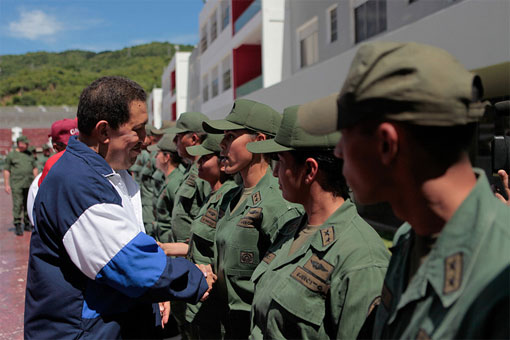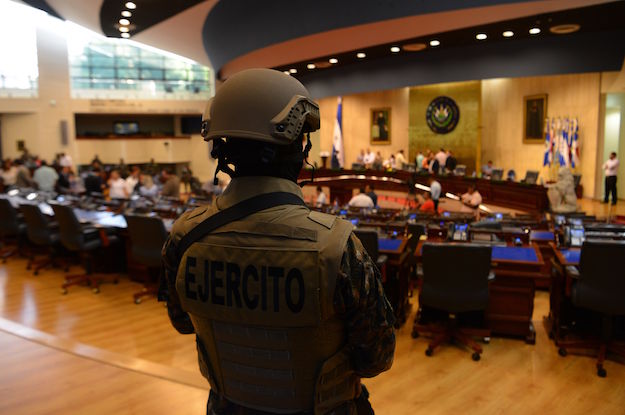Election year in Venezuela kicks off on February 12 with the governor of the state of Miranda, Henrique Capriles Radonski, comfortably leading in the polls and projected to win the opposition primary. He will face the campaign machine of President Hugo Chávez or “El Comandante,” which is marching ahead with the well-oiled efficiency of a Roman legion. But another factor, the armed forces, will play a critical role in the event of a potential transfer of power.
Basking in the annual commemorations of his attempted coup in 1992 (“4F”) and his first presidential inauguration 13 years ago, President Chávez completed a series of senior military and political appointments in January that, in the words of one former army officer, amount to the creation of a close-knit command or “mando cerrado” determined to secure the continuation of Chávez’s so-called Bolivarian Revolution.
The question is, will this be by fair means or foul? “Imagine a coup like 4F but this time led not by a lieutenant colonel and captains, but a president, generals and members of the National Assembly supported by irregular combat forces. That is what is being prepared,” said one former officer, now a successful businessman, who retains close links with his military peers.
President Chávez’s ill health lends his campaign a certain air of unreality, since he is simultaneously planning his own succession. According to a range of United States and Latin American intelligence sources, as well as sources within his own government, Chávez’s cancer is much worse than admitted. They say he is suffering from prostate and colon cancer that has metastasized to his lower back vertebrae and other parts of his body.
Further, according to alleged medical reports cited by the Spanish ABC newspaper, Chávez has abandoned chemotherapy, apparently in order to keep his energy up for the election campaign. Barring a medical miracle he probably has no more than 18 months to live, maybe much less.
With Chávez’s death possible before or after the presidential election, which has already been brought forward to October—and which in any event he might lose—the armed forces will be a crucial factor in protecting the constitution or otherwise, and in enabling or preventing the transfer of power.
Two recent appointments command attention. The first is that of General Henry Rangel Silva as minister of defense. General Rangel Silva, who is listed by the U.S. Treasury as a Specially Designated Narcotics Trafficker and is alleged to help the Revolutionary Armed Forces of Colombia (FARC) smuggle cocaine into Venezuela, has made no secret of his limited regard for the 2012 election. In 2010 he said: “A hypothetical opposition government would be to sell the country and the Armed Forces would not accept it.”
General Rangel Silva served as a captain in the parachute regiment that led the 1992 coup attempt under then Lieutenant Colonel Chávez. A fellow conspirator and member of their group, known as “The Centurions”, is the second recent key appointee: Diosdado Cabello, then a Lieutenant, who had become a protégé of Chávez while his pupil at the army academy.
Diosdado Cabello, head of the media and telecommunications regulator, Conatel, a former minister of public works and the governor of the state of Miranda before losing to Capriles Radonski, was appointed in December as first vice president of Chávez’s United Socialist Party of Venezuela (PSUV). In January he became president of the National Assembly.
After a lengthy period of frosty relations between Cabello and Chávez, this represented a rapprochement between two men whose needs and destinies are intimately entwined. Chávez needs Cabello to control both his party and the armed forces. According to several former Army and National Guard officers, Diosdado carries more influence within the armed forces than any other single figure—arguably more than El Comandante himself.
In the event that Chávez loses in October, or that he dies before or after re-election, Diosdado looks likely to be the key player in deciding how the military will respond to a transfer of power that may threaten their political and economic supremacy. In his quest for loyalty and influence, Chávez has appointed senior officers to lucrative positions throughout the public sector which they will be reluctant to abandon.
Cabello is a feared figure. Allegedly, he sends his henchmen to take over businesses at will, and has used his power to amass an enormous fortune which is then used to buy more loyalty and to obtain high-level jobs for his relatives and allies.
Diverse intelligence and military sources say he controls the army’s critical tank and infantry units. Although no longer in active service, Cabello’s influence rests not only on his historic relationship with Chávez, but also—in line with Venezuelan military convention—on the fact he graduated second in his army training year. Chávez is understood to seek his opinion before senior officer promotions: loyalty not talent being of exclusive importance. Another critical factor in senior officers’ support for Cabello is that he rejects the influence of the Cubans, who are resented for the privileged status and treatment they are afforded by Chávez in the armed forces as elsewhere in his government. (For their part, the Cubans view Cabello as corrupt.)
In exchange for throwing his weight behind Chávez, with whose brother Adán he has long maintained a close relationship, Cabello is reported by government sources to have been promised a nominee to replace PDVSA’s president, Rafael Ramirez, as well as the vice presidency, currently held by Elias Jaua, for himself.
A vice president may be replaced by a president at any time—or forced out by a vote in the National Assembly. If Chávez were to die before the election, he would be succeeded by his vice president until the election, in accordance with Article 233 of the constitution. If Chávez were to die within the first four years of a new term, the vice president would be president until elections were held 30 days later.
How trenchantly the Bolivarian Revolution would be defended by its military and political stalwarts, however, is doubtful. At its ideological heart are the Cubans, with up to 50,000 working as doctors and government and military advisors. With Cabello in ascendancy and an opposition victory possible, they are worried about losing their supply of cheap oil but leery of overstepping the mark and becoming implicated in acts of violence to defend the regime.
However, the Cubans could provoke trouble through the armed militias, known as “Los Colectivos“, that they have trained in urban areas. There are reported to be about 12 of these groups in Caracas, comprising several hundred people, and in the face of an electoral loss and/or the death of Chávez they could readily be instigated to violence and looting, which could spread throughout the city and provide potential justification for military intervention and a suspension of constitutional guarantees.
Yet few believe that the swollen ranks of the generals, who are perceived to have focused more on self-enrichment—including drug trafficking—than on their military duties, thereby undermining operational capability and junior officer morale, would have either the capacity or the stomach for violent confrontation.
Finally, as the opposition coalition elects its candidate to take on Chávez—who is believed to enjoy a bedrock support level of 35 percent—some comfort may rest in the fact that the violent human right abuses typically associated with political-military regimes have been notably absent.
The initial behavior of Chávez’s senior officers in response to the 2002 coup provides added reassurance that the military is ultimately unlikely to block an unwelcome transition. Most fled, with Diosdado Cabello hiding in an ambulance.






